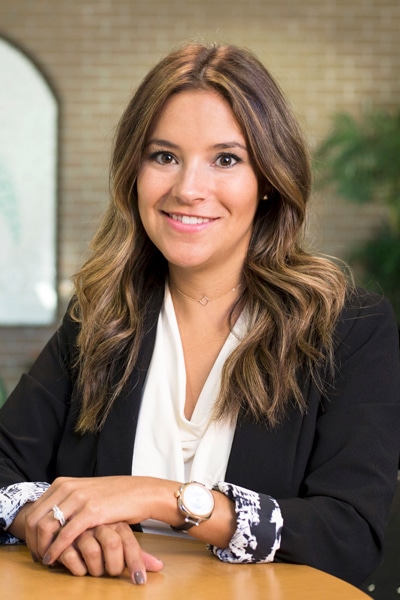Christina Flint refuses to compromise.
The thirty-five-year-old senior vice president, general counsel, and corporate secretary for Flint, Michigan-based Diplomat Pharmacy wants to be an accomplished executive and a loving mother, and she believes neither goal should suffer for pursuit of the other.
Flint joined Diplomat in 2012 as a corporate counsel, before she had her first child. Six years later, the Flints have three kids, from ages five months to five years old, and she’s been promoted three times.
In her more than six years at the company, Flint has been instrumental in helping the company navigate complex legal matters. For instance, she helped lead the company through its IPO in 2014. Then, in 2016, Diplomat had to defend its first securities class-action law suit and a derivative action, as well as support an investigation by a special independent committee of the board of directors, all within a few months of Flint becoming Diplomat’s general counsel. She was also vital to Diplomat’s eight acquisitions, which totaled $725 million in 2017. Lastly, she assisted the organization through a shift of its strategic direction—as a result of the past two acquisitions, Diplomat is now in the pharmacy benefit management business.

Flint was also an important calming voice at the company as its growth, in part, led to three different CEOs, two different presidents, two different CFOs, and two CIOs in the past two years. She’s also been a key resource to move corporate governance initiatives and processes through the board. Through of all this, Flint’s busy work schedule paralleled happy changes at home.
“Before we had the third child, we really had to think hard,” Flint says. “I had just stepped into the general counsel role and we asked ourselves, ‘Would this be doable?’ I didn’t want to decide whether to have a third child based on what was happening in my career at the moment or where I wanted it to go.”
Flint has had to learn to integrate work and family on the fly. She says she did not see women executives raising young children early in her career, and the ones that had older children seemed frustrated with the amount of time they could spend with their families.
Flint says she’s managed to not only survive but also thrive on both fronts because of a few key factors: parents and in-laws who live nearby, her husband’s flexible schedule, her supportive team, strong outside counsel, her status within Diplomat, and technology.
“There’s no way I could get through the day without telling Siri to take down a reminder,” Flint says. “Sometimes my mother-in-law picks up the kids at the office, and as I’m buckling car seats she’ll ask me to bring some more diapers the next day, and I’ll think, ‘I’m running into the office right now, I don’t have space in my brain to remember that,’ so I’ll immediately tell Siri, ‘Remind me to bring diapers tomorrow at 8 a.m.’”
This is the type of advice she shares with other women in a regular women’s discussion group at Diplomat named Women Inspiring Women. Although Flint did not see executives as mothers of smaller children early in her career, she finds herself in exactly that position for her team of attorneys. She says much of what she tells them is to simply communicate your needs.
Flint is quick to point out an example of communication’s importance in the workplace. Soon after returning from her most recent maternity leave, she had to attend a board meeting at one of Diplomat’s satellite offices. She has committed to nursing her babies for a year, so she called ahead to the location and asked for a separate room to feed the baby. When she arrived not only was there a conference room reserved for her, but also there was a bonus playpen she had not asked for.
Flint’s point is that aside from the fundamentals like health insurance and maternity leave, companies can only help their working moms if the moms communicate their needs.
“I created what works for me,” she says. “I think it’s on employees to bring it up and to propose solutions. The company’s responsibility is to be open to the suggestions and to hopefully put them into practice. For your own personal situation suggest what would work for you, be vocal about it, and don’t be ashamed or embarrassed.”
Although she didn’t have people modeling that type of behavior to look up to early in her career, she appreciates the opportunity to do that for her team.
“I hope I’m providing that guidance now,” she says. “The mentor piece is really about having an open dialogue, and I think people feel more comfortable when they know, ‘My boss gets it.’”
“One of the things other women say to me is, ‘How are you doing this, being general counsel and having three young kids?’” Flint says. “It strikes me sometimes as, ‘Oh, is that a lot?’ It doesn’t hit me until someone asks me that question that I am handling a lot and managing it well.”
Jackson Lewis P.C. is a law firm with more than 850 attorneys in major cities nationwide. We represent more than 1,800 healthcare industry employers on the full range of labor and employment issues. To learn more, visit jacksonlewis.com/industry/healthcare.

